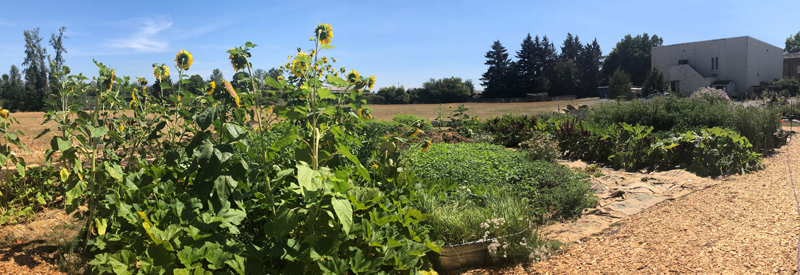PCEF grant funds NAYA’s Food Sovereignty Project
As part of Portland City Council’s approval of clean energy grants this spring, NAYA Family Center is receiving a $3.69 million, 5-year grant from the Portland Clean Energy Community Benefits Fund for renewable agriculture and green infrastructure. This significant infusion of funds will help NAYA realize its vision of creating a productive and welcoming space where our region’s Native community can gather and connect with culture for generations to come.
NAYA is using the money to convert 4.2 acres of former baseball fields, located in the back of our main campus in Northeast Portland, into a farm, traditional medicine garden, community gathering space, and playscape. NAYA is located on Neerchokikoo [near-cho-kee-koo], an ancient Native encampment and gathering site near the confluence of the Columbia and Willamette Rivers. For many centuries, Native Americans from tribes throughout the area came to this land to gather, trade, and build community. With this money and a lot of work ahead, we will be transforming this historic land, making it all the more important for us to complete our Return to Neerchokikoo Campaign to retire our mortgage debt, reclaim the land, and own our property outright.
Portland’s $107 million in green energy grants is the largest climate investment in the city’s history. The grants are funded through the Portland Clean Energy Fund (PCEF), a first-of-its-kind program that uses a surcharge on large retailers in the city to fund green energy projects that prioritize low-income Portlanders and communities of color.
The PCEF grant will help us develop a Native Food Sovereignty project centered on traditional agricultural practices, which have been used on Turtle Island to feed people and care for the land since time immemorial. The climate crisis and Indigenous land dispossession both share a root cause in colonialism; we aim to address those issues by focusing on Indigenous land sovereignty and restoring ecological stewardship practices.
“A food sovereignty movement has started at NAYA, and we will draw on the strengths of youth, elders, and the community to guide this movement,” said NAYA’s Director of Youth and Education Services Daniel Guilfoyle. “This project will benefit the Native community by supporting their desire to learn more about how to gather, prepare, and know where traditional foods come from, along with increasing knowledge of the impact of colonialism on traditional food systems. Our collaborations with community programs and stakeholders will further strengthen this work.”
As part of the efforts to reclaim the baseball fields behind NAYA’s campus, staff and volunteers have worked through the summer, and will continue to labor into fall, to convert previously unused grassy areas into 11 productive garden beds!
Some of the gardens have already produced at least one ton of food so far, which was donated to our community though food boxes and U-Pick garden days, used in daily meals prepared in our commercial kitchen, and preserved for winter by canning. This was tough work made possible by people who are passionate about food sovereignty—they hand watered garden beds daily, carried buckets of water to thirsty patches of pumpkin and squash, and created a system for catching rainwater to ensure regular garden irrigation and the establishment of crops.
Dedicated to uplifting our community, NAYA will continue to grow and thrive by remaining rooted in our shared heritage and connections to the land.
“We are addressing food insecurities and lack of access to traditional foods and medicine,” said Guilfoyle. “Led by our core values, we will support our community in reclaiming our health and traditional way of being.”
